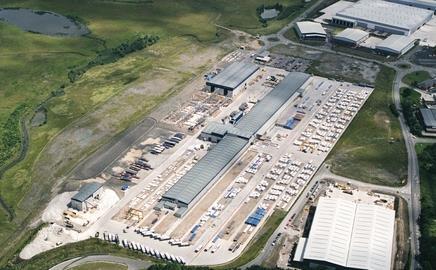Established in 1919, Bison specialises in the design and manufacture of structural precast concrete products. Precast flooring accounts for about 80% of its products and includes hollow, core, solid and composite floors.
The company has a turnover of about £100m a year and has four factories across the UK, including its flagship at Swadlincote, Derbyshire. It employs more than 600 people and produces about 1.2 million m2 of flooring a year, equivalent to 20% of the UK market. Colin Richardson, the group commercial director, talks about the latest innovations in this increasingly competitive sector.
Describe your market
The market can be broken down into four segments – flooring; stairs and landings; beam and block; and modular construction. We operate in the private housing, public housing, and commercial and industrial sectors. In all these areas we face extreme competition.
We are competing against steel and timber and the rising cost of these raw materials is shadowed by the rising cost of aggregates and cement. My concern at the moment is that with double-figure increases in material prices, developers might find buildings will just become too expensive to be built.
Which sectors are busiest?
The strongest growth sectors are the education and health markets. Prisons are also going to be a busy sector in the next few years, as the race to build more and better ones begins.
What are the lead times on products?
Hollow core flooring is four to six weeks, cross wall is up to 16 weeks and beam and block is two weeks.
What developments are in the pipeline?
One of the biggest areas we are focusing on is reducing carbon emissions. In the coming year we want to use ground granulated blast furnace slag as a cement substitute in all our manufacturing facilities. At the moment we use it in 50% of them. Depending on the location of the plant, the proportion of cement substitute we can use varies. In Scotland, for example, the locally sourced cement does not combine well with the ground granulated blast furnace slag.
In other plants we replace up to 40% of cement with it. By using a proportion of ground granulated blast furnace slag – and the efficiency of the manufacturing plant – we are hoping clients will be able to get better credits under the BREEAM rating system or the Code for Sustainable Homes.
What about product developments?
We’ve developed a flooring product where the insulation is bonded to the base of the hollow core slab before its delivery to site. It’s now being used for cold storage applications where it can be used in situations where there are poor ground conditions and where you need the load and span capabilities.
We've also entered into a strategic partnership with Velta UK to provide a floor heating and cooling system which is pre-cast into Bison flooring products and then linked, for example to a heat pump to provide more energy efficient heating and cooling. The system has been fully developed and we are now looking for our first application. It can be cast into our hollow core slabs as well as wet cast products.
Are there any health and safety innovations?
We have developed lifting hooks that are machine-inserted into our hollow core flooring. Bison holds the European patent for this process, which avoids the need to use wrapping chains to lift the panels into position, enables faster, safer and more accurate erection and minimises damage to soffit and blockwork bearings.
Specifier 25 January 2008

- 1
- 2
- 3
 Currently
reading
Currently
reading
Bison: Set to succeed
- 5
- 6
- 7
- 8
- 9
- 10
- 11
- 12
- 13
- 14
- 15

































No comments yet